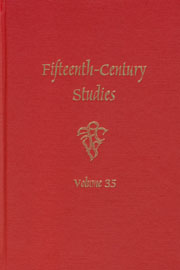Book contents
- Frontmatter
- Contents
- Preface
- Essays
- 1 Violencia en tres cuentos hagiográficos de la España medieval
- Physical Impairment in the First Surgical Handbooks Printed in Germany
- Serious Elements in Medieval French Farces: A New Dimension
- Narrative Afterlife and the Treatment of Time in Henryson's Testament of Cresseid
- Euclid in Boethius's De Consolatione Philosophiae and Some of its English Translations
- Seeking the Medieval in Shakespeare: The Order of the Garter and the Topos of Derisive Chivalry
- A Revelation of Purgatory and Chaucer's Prioress
- Eyeglasses for the Blind: Redundant Therapies in Meschinot and Villon
- Jean de Meun in the Cité des Dames: Author versus Authority
- The Festival Context of Villon's Pet au Deable: Martinmas in Late-Medieval Paris
Serious Elements in Medieval French Farces: A New Dimension
from Essays
Published online by Cambridge University Press: 12 September 2012
- Frontmatter
- Contents
- Preface
- Essays
- 1 Violencia en tres cuentos hagiográficos de la España medieval
- Physical Impairment in the First Surgical Handbooks Printed in Germany
- Serious Elements in Medieval French Farces: A New Dimension
- Narrative Afterlife and the Treatment of Time in Henryson's Testament of Cresseid
- Euclid in Boethius's De Consolatione Philosophiae and Some of its English Translations
- Seeking the Medieval in Shakespeare: The Order of the Garter and the Topos of Derisive Chivalry
- A Revelation of Purgatory and Chaucer's Prioress
- Eyeglasses for the Blind: Redundant Therapies in Meschinot and Villon
- Jean de Meun in the Cité des Dames: Author versus Authority
- The Festival Context of Villon's Pet au Deable: Martinmas in Late-Medieval Paris
Summary
Farces are short comic plays usually involving a trick by which one or more characters deceives another for personal gain. Major popular entertainments mostly in urban areas during the fifteenth and sixteenth centuries, farces were often played on trestle stages that were quickly set up in streets or squares on holidays. The small number of roles required few actors and stage props, making the plays easily transportable. Farces were written and played by amateur groups, such as student organizations, municipal confraternities, trade guilds, and jongleurs. There are numerous references in fifteenth- c. documents to the staging of farces, but no plays have survived that antedate the Farce de maistre Pathelin, written in the 1460s. About 175 farces date from the hundred years following the appearance of Pathelin.
Modern research on French farces has concentrated on three aspects of the plays: their structure, themes, and possible genres. The results of this scholarly activity suggest that no unified construction exists, but instead many different comic “systems” hold sway, often based on an automatic formula, a “machine á rire” (Bernadette Rey-Flaud); the themes include all human activities (often domestic) and render the plays “mirrors of reality” (Barbara Bowen and Jean-Claude Aubailly); while genres seem recognizable, a farce may reflect more than one type of genre and be quite complex, deemed thusly by Alan E. Knight. As religious theater does not always remain serious (consider the comic diversions in mystery plays), the universe of farces cannot be reduced to grotesque distortions, to ridicule, satire, buffoonery, and obscenities.
- Type
- Chapter
- Information
- Fifteenth-Century Studies , pp. 23 - 49Publisher: Boydell & BrewerPrint publication year: 2009



